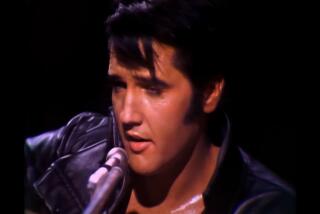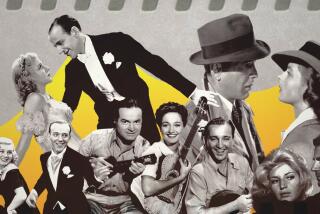When the Z Channel ruled L.A.
“You don’t know you’re living in a golden age when you’re in it,” declares filmmaker Alexander Payne in the documentary “Z Channel: A Magnificent Obsession.” The golden age he’s referring to is the 15-year run of the wonderfully eclectic cable channel that aired foreign classics, obscure indies and documentaries alongside Hollywood blockbusters, but unless you lived in the Los Angeles area in the 1980s and had access to it, you had no idea of the nightly treasures the service provided -- until now.
Director Xan Cassavetes’ riveting film not only re-creates the glory days of the Z Channel through a generous offering of film clips and interviews, but also presents a clear-eyed portrait of its creative driving force, Jerry Harvey, and the tragic circumstances of his death. Cassavetes, the daughter of Gena Rowlands and John Cassavetes, possesses the fervent ardor of a true fan -- she grew up watching Z and her own obsession with it led to the making of the film -- but manages to neither glorify nor demonize Harvey while unraveling the intertwined histories.
For the record:
12:00 a.m. Oct. 14, 2004 For The Record
Los Angeles Times Thursday October 14, 2004 Home Edition Main News Part A Page 2 National Desk 1 inches; 43 words Type of Material: Correction
Z Channel -- In the review of the documentary “Z Channel: A Magnificent Obsession” in Wednesday’s Calendar section, the cable channel was called California’s first pay-TV service in 1974. There was at least one previous system, the short-lived Subscription Television Inc. in 1964.
The Z Channel launched in 1974 as California’s first pay-TV service, showing two movies a week, and quickly became required viewing for Hollywood’s elite and cinephiles alike. Harvey became director of programming in 1980 and within two years had transformed Z into a 24-hour cinematic cornucopia showing more than 20 films per week built on auteur-driven film festivals and cleverly conceived double features (for example, U.S. release and uncut versions of Sergio Leone’s “Once Upon a Time in America”).
Still in his early 30s at the time, Harvey was an energetic, imaginative man whose zeal for film was offset by a dark, brooding countenance masking a deeply unhappy childhood.
Two crucial pieces of biographical archeology -- photos taken by Harvey’s first wife, Vera Anderson, in the ‘70s and early ‘80s and a 1985 interview he did on KCRW-FM -- are used by Cassavetes to maximum effect in giving Harvey a strong presence in the film. There’s something about the innate loneliness of that late-night radio interview, played over hazy L.A. landscapes shot by cinematographer John Pirozzi with his 16-millimeter Bolex, that provides a haunting sense of Harvey’s moods and devotion to cinema.
The Z Channel is fondly remembered both by the filmmakers it inspired -- Payne, interviewed wearing the vintage Z Channel T-shirt he received for writing them a letter, and Quentin Tarantino, who watched Z vicariously off videotapes made by a friend -- and those whose films Harvey showed (and in some cases, resurrected), such as Robert Altman, Henry Jaglom, Vilmos Zsigmond, Paul Verhoeven and Alan Rudolph.
Before Harvey turned them into event programming, director’s cuts were often considered legendary creatures left to languish in studio vaults or be destroyed. But on Z, screenings of uncut versions of “Heaven’s Gate” and “1900” and the longer European television versions of “Das Boot” and “Berlin Alexanderplatz” were appointment viewing long before HBO became cable’s critical darling.
Harvey’s colleagues and close friends, including film critic F.X. Feeney (a co-producer of the film), who wrote for the Z Channel program guide, reminisce about his intensity and passion for film. They remember a man who could be generous and kind as well as someone who fought his demons on a daily basis.
Cassavetes does a masterful job of weaving Harvey’s life into the unique story of the Z Channel while building to the unsettling climax. In the end, it’s difficult even for his friends to separate Harvey from his accomplishments at Z and the shocking way his life ended.
The ultimate compliment for the documentary may be to say that “Z Channel: A Magnificent Obsession” is every bit as complex as the channel’s diverse programming, featuring humor and tragedy and a genuine love of cinema. It’s exactly the type of movie Jerry Harvey would have enthusiastically showed on the Z Channel.
*
‘Z Channel: A Magnificent Obsession’
*
MPAA rating: Unrated
Times guidelines: Adult situations, language and nudity
The Independent Film Channel presents a Maja Films and Fresh Produce Films production, released by IFC Films. Director Xan Cassavetes. Producers Rick Ross, Marshall Persinger. Executive producers Alison Palmer Bourke, Ed Carroll. Director of photography John Pirozzi. Editor Iain Kennedy. Music Steven Hufsteter. Running time: 2 hours, 2 minutes.
Exclusively at Laemmle’s Sunset 5, 8000 Sunset Blvd., West Hollywood, (323) 848-3500.
More to Read
Only good movies
Get the Indie Focus newsletter, Mark Olsen's weekly guide to the world of cinema.
You may occasionally receive promotional content from the Los Angeles Times.











